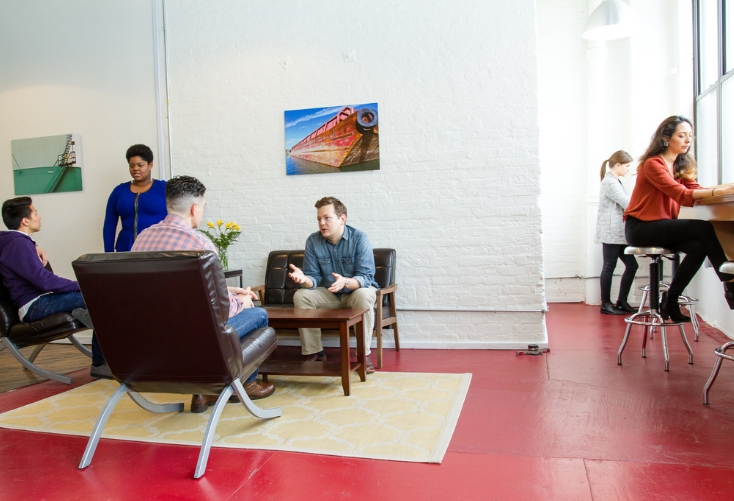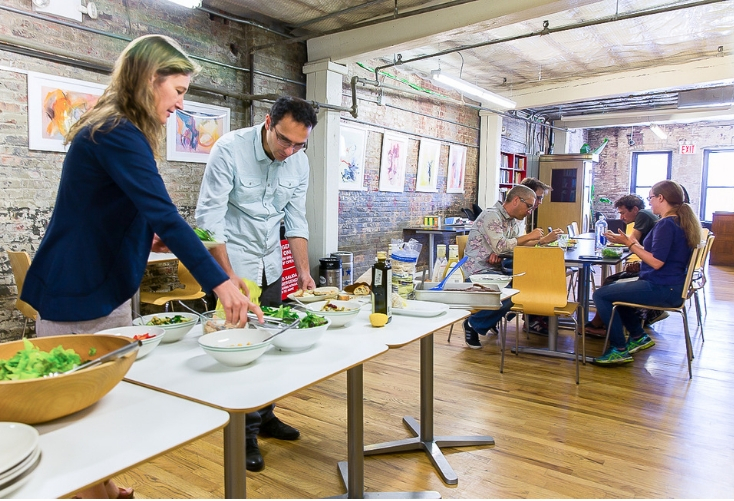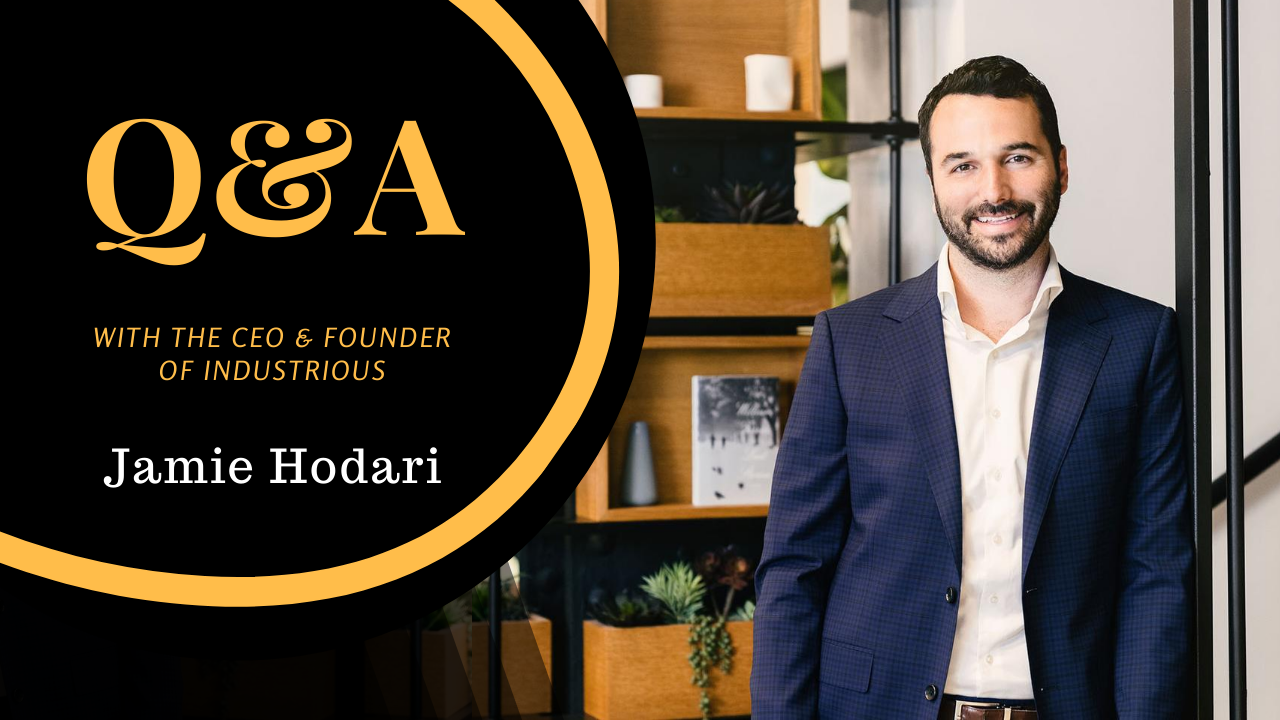- “We’re all human. Conflict happens. We wanted to give tools for addressing conflict that strengthens the culture” – Brooklyn Creative League co-founder Neil Carlson.
- Building a positive culture is vital when you’re in the business of helping people create authentic professional relationships with each other.
- To enable people and professional relationships to flourish, BCL introduced behavioral guidelines to optimize the member experience and add value to the community.
In Part 1 Neil Carlson spoke about why he chooses to keep Brooklyn Creative League small, and the economic advantages it provides. In Part 2 he discusses how BCL introduced behavioral guidelines to optimize the member experience and add value to the business and community.
Allwork.Space: Can you tell us more about how maintaining a small community becomes a competitive advantage?
Neil Carlson: One of Peter Drucker’s classical innovation theories is that in any industry you can try to do something at an industrial scale, in which case you’re competing to drive down costs and produce things on a smaller margin and make your money at that massive scale.
Or, you specialize and create a niche market that you can dominate, because your product is so unique and specialized that other people will have difficult time duplicating that. That’s been our strategy.
The area where we chose to compete is around building culture and community and creating a space where people know each other and have genuine and authentic professional relationships with each other.
What tools did you use to develop a culture built on community?
We started analyzing our culture and the way we built our community. We’re all human. Conflict happens. We wanted to give tools for addressing conflict that strengthens the culture.
We created what we call guidelines, not rules, that outline the relationship between BCL members and BCL staff and the way we expect BCL members to treat each other. By putting it in writing, it sets clear expectations on how to act while being flexible enough to allow infallibility. It provides recourse on how to deal with situations where people feel guidelines aren’t being respected.

What did you include in the guidelines?
We asked “What are the things that really suck? What are the pain points when people have to deal with each other?”
It’s cleaning up after other people. It’s the friction that comes from different expectations and different ways of approaching people and interpersonal styles. So, we asked, “How can we make that go away by negating the issue? Or how can we mitigate the amount of conflict and the drama and angst that comes from that?”
How can you give people the tools to treat each other respectfully, to be more empathetic, to take the other person’s point of view, to check their own feelings and anger and maybe not get so spun up on that?
Is that why you’ll never see a sign asking members to put their dishes in the dishwasher at BCL?
So, for something like doing the dishes, it’s going to take us 30 to 45 minutes a day, an hour tops, to load and unload the dishwasher. Is that worth the price of admission in reducing conflict that comes from people not doing dishes?
And there’s also an added benefit of people walking in the kitchen and saying “I don’t have to worry about doing the dishes. I clean up after my kids all day at home. It’s so nice to have someone take care of that and make me feel like I’m being taken care of.”
How did you introduce the guidelines to your members and how was it received?
For existing members, we posted it on our message board. We’ve got it printed on a 4 x 6-foot wall decal. We posted it in the reception area of both spaces. We have the phone guide; the conflict guide and the membership compact along with a cover letter, and we gave a physical copy to everyone in the space.
It’s been in place about two months. It was very well received. We got feedback from people saying “This is really great. I’m glad you decided to do this. It really rings true to the implicit culture that we’ve known and loved at BCL and I’m glad that you guys have so thoughtfully laid this out.”
More practically we’re seeing it in what we’re not seeing. We’re not seeing people having arguments over this guy talking on the phone next to me. We’re not seeing people getting upset about someone taking up too much space in the refrigerator.
From our perspective, that’s happening because people are abiding by the behavior guidelines we set out. Or, they have tools to deal with things as they come up, member to member. And we’ve also seen it as we’re giving tours. What we’re saying is that you’re joining a community.
A community has rights and obligations on both sides of that equation. To manage it well, you have an obligation to understand and fit into the culture and to treat other members with respect and courtesy and deal with problems when they come up in respectful manner.
It’s not kumbaya. It doesn’t mean there’s never going to be conflict. It’s “How do we get along with different wants and needs and styles in the world, in a way that is respectful and understanding and harmonious?”

Have you had to offboard any members who were not abiding by the guidelines?
We have. There was a member who was doing a lot of interviews on the phone. We asked him to keep his voice down. He said “I can’t really do that. That’s how I am.” We said “We really like you and we respect the work you’re doing but this is not a good fit.” We were able to part amicably. It was a bummer on all sides.
But we realized that unless we stuck to our guns, we would really undermine the value of the experience for everyone else. From a business perspective, if we allowed that to happen, we would undermine the value of our business and lose other members.
Are there other ways culture contributes to the bottom line?
We spend 8 to 12 hours of our day at work. It should be a pleasant experience. You should enjoy the people you work around even if you’re not best friends with them. There needs to be a level of respect and collegiality and fun and laughter that goes with that. That stuff’s not rocket science. It’s creating and building culture.
It’s hard work and it takes thought and it takes people, so we probably have higher payroll costs than a lot of our competitors. But I think that creates the kind of culture we want and that leads to stickier membership, which leads to lower costs of customer acquisition, marketing and all those other variable costs that can really add up when you’re running a coworking space.

 Dr. Gleb Tsipursky – The Office Whisperer
Dr. Gleb Tsipursky – The Office Whisperer Cat Johnson – Coworking Marketing Maven
Cat Johnson – Coworking Marketing Maven Angela Howard – Culture Expert
Angela Howard – Culture Expert Drew Jones – Design & Innovation
Drew Jones – Design & Innovation Andrea Pirrotti-Dranchak – Competitive Advantage
Andrea Pirrotti-Dranchak – Competitive Advantage Jonathan Price – CRE & Flex Expert
Jonathan Price – CRE & Flex Expert Jeremy Fennema – Tech Innovation Alchemist
Jeremy Fennema – Tech Innovation Alchemist







